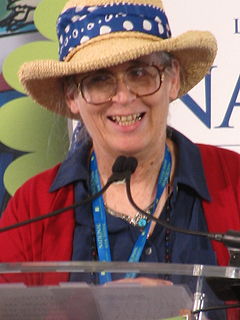A Quote by Ann Leckie
Science fiction in particular is often assumed to be about the future, or about some abstract technological or philosophical idea, or just about 'adventure,' but writers can't build worlds out of nothing. We use bits and pieces of the real world to assemble our fictional ones.
Related Quotes
What writers of fantasy, science fiction, and much historical fiction do for a living is different from what writers of so-called literary or other kinds of fiction do. The name of the game in F/SF/HF is creating fictional worlds and then telling particular stories set in those worlds. If you're doing it right, then the reader, coming to the end of the story, will say, "Hey, wait a minute, there are so many other stories that could be told in this universe!" And that's how we get the sprawling, coherent fictional universes that fandom is all about.
I don't put a very clear label on my work. If anything, I write science fiction - looking at a moment now, in the present, and then extrapolating outward to think about what the future might look like if this particular trend goes on, or if this particular trend is the most dominant. That's a science fictional tool.
Science fiction is the most important literature in the history of the world, because it's the history of ideas, the history of our civilization birthing itself. ...Science fiction is central to everything we've ever done, and people who make fun of science fiction writers don't know what they're talking about.
If you thought you were trying to find out more about it because you're gonna get an answer to some deep philosophical question...you may be wrong! It may be that you can't get an answer to that particular question by finding out more about the character of nature. But my interest in science is to simply find out about the world.
I love science fiction but I don't like fantastic [cinema]. For example, if you have a magical ring and you can explode the world with it. What are we talking about? You know, it's not interesting. I don't like Lord of the Rings. Even Star Wars, for me, I don't understand this kind of story. But Alien, because the rules of the game are very precise, it could happen. I love science fiction. I have an idea about robots in the future.

































